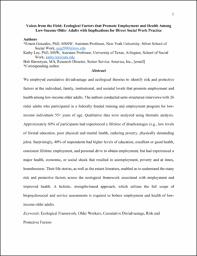
ATTENTION: The works hosted here are being migrated to a new repository that will consolidate resources, improve discoverability, and better show UTA's research impact on the global community. We will update authors as the migration progresses. Please see MavMatrix for more information.
Show simple item record
| dc.contributor.author | Gonzales, Ernest | |
| dc.contributor.author | Lee, Kathy | |
| dc.contributor.author | Harootyan, Bob | |
| dc.date.accessioned | 2020-04-16T16:49:47Z | |
| dc.date.available | 2020-04-16T16:49:47Z | |
| dc.date.issued | 2019-08-08 | |
| dc.identifier.issn | 0091-1674 | |
| dc.identifier.uri | http://hdl.handle.net/10106/29052 | |
| dc.description.abstract | **Please note that the full text is embargoed** ABSTRACT: We employed cumulative dis/advantage and ecological theories to identify risk and protective factors at the individual, family, institutional, and societal levels that promote employment and health among low-income older adults. The authors conducted semi-structured interviews with 26 older adults who participated in a federally funded training and employment program for low-income individuals 55+ years of age. Qualitative data were analyzed using thematic analysis. Approximately 60% of participants had experienced a lifetime of disadvantages (e.g. low levels of formal education, poor physical and mental health, enduring poverty, physically demanding jobs). Surprisingly, 40% of respondents had higher levels of education, excellent or good health, consistent lifetime employment, and personal drive to obtain employment, but had experienced a major health, economic, or social shock that resulted in unemployment, poverty and at times, homelessness. Their life stories, as well as the extant literature, enabled us to understand the many risk and protective factors across the ecological framework associated with employment and improved health. A holistic, strengths-based approach, which utilizes the full scope of biopsychosocial and service assessments is required to bolster employment and health of low-income older adults. [This is a post-print of an article published by Springer in Clinical Social Work Journal on August 08, 2019, available online: https://link.springer.com/article/10.1007/s10615-019-00719-x.] | en_US |
| dc.language.iso | en_US | en_US |
| dc.publisher | Springer | en_US |
| dc.relation.ispartofseries | Clinical Social Work Journal; | |
| dc.title | Voices from the Field: Ecological Factors that Promote Employment and Health Among Low-Income Older Adults with Implications for Direct Social Work Practice | en_US |
| dc.type | Article | en_US |
Files in this item
- Name:
- Voices from the Field- Ecological ...
- Size:
- 253.0Kb
- Format:
- PDF
- Description:
- PDF
This item appears in the following Collection(s)
Show simple item record


